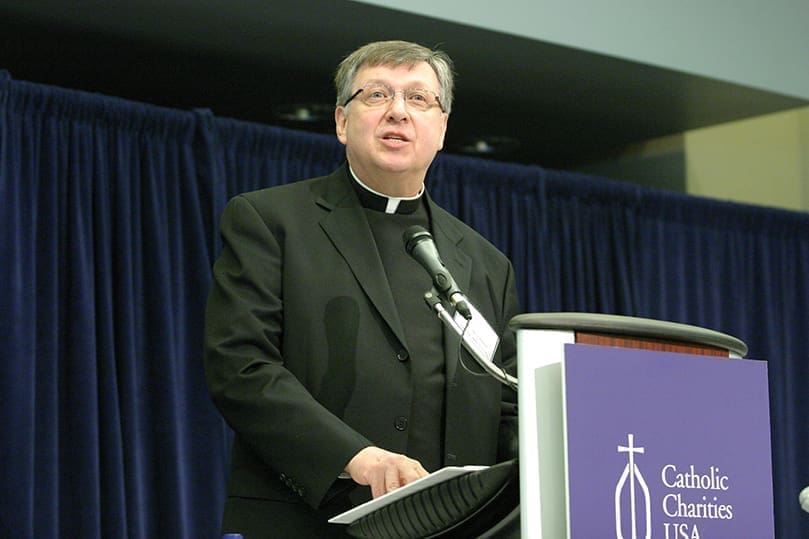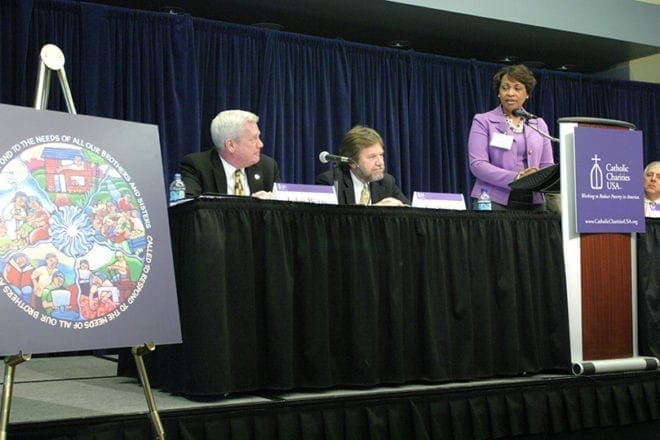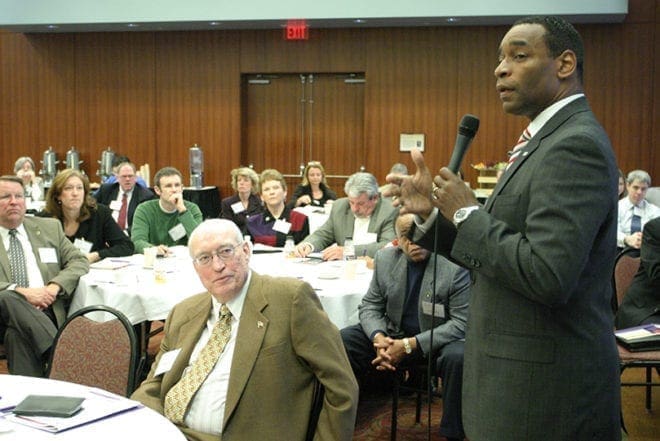 Photo By Michael Alexander
Photo By Michael AlexanderAtlanta
At Summit, Leaders Urged To Fight Poverty Harder
By ANDREW NELSON, Staff Writer | Published March 4, 2010
Advocates for the poor exchanged “big ideas” on how to cut poverty in half in the United States at a leadership summit.
Father Larry Snyder, president of Catholic Charities USA and a member of the White House Council of Faith-based and Neighborhood Partnerships, said the economic downturn has produced a “new poor,” families in the middle class who now turn to public assistance and charities they may have donated to in the past, while job prospects are bleak.
But that doesn’t mean the Catholic Charities’ goal cannot happen, he said. As it celebrates its centennial, Catholic Charities USA has set a goal to reduce poverty by 50 percent by the year 2020.
People are resourceful and creative and can solve problems, he said. Just as going to the moon seemed impossible during the early 1960s but was accomplished before the end of that decade, lifting people out of poverty is possible, he said.
“That same resolve is needed if we are to reduce poverty,” he said.

Jackie Parker, vice president of global diversity, Newell Rubbermaid, standing, serves as moderator during a panel discussion on a regional response with innovative solutions to poverty. The panel included John A. Berry, far left, executive director of St. Vincent de Paul, Bill Bolling, executive director of the Atlanta Community Food Bank, as well as Mark Crozet, senior vice president of development, Habitat for Humanity International, and Michael A. Young, CEO of Grady Health Systems. Photo By Michael Alexander
As the economic recession grip tightened, millions more people found themselves out of work and without health care. Close to 40 million people lived at or below the poverty level in 2008, which is a family of four living on $22,025 a year.
The nation’s poverty rate rose to 13.2 percent in 2008, up from 12.5 percent in 2007, according to Census Bureau data. That was the first significant increase since 2004 and the highest level in 11 years.
Father Snyder said poverty rates would fall if there was the political will to make it happen. History shows it can be done, he said, since from 1958 to 1971 the number of people in poverty fell from 22 percent to 11 percent.
He urged leaders in Atlanta to be creative, to solve problems they see here and to break out of silos to share ideas.
“Poverty is not monolithic. Local poverty will need local solutions. We can and we must learn from each other,” he said.
Catholic Charities USA organized the event on Wednesday, Feb. 24, at the Loudermilk Center. People shared success stories and hurdles to be overcome. It was part of the Catholic Charities USA centennial celebration, one of 10 summits being held around the country. Ideas from these meetings will be used to develop legislative proposals in Congress.
Attending the day-long meeting were Jackie Parker, vice president of global diversity, Newell Rubbermaid; Bill Bolling, executive director, Atlanta Community Food Bank; Mark Crozet, senior vice president for development, Habitat for Humanity International; Michael Young, chief executive officer, Grady Health Systems; and John Berry, executive director, St. Vincent de Paul Society Atlanta Council. Archbishop Wilton D. Gregory also attended.
Kent “Oz” Nelson, former chairman and CEO of United Parcel Service, told the group that despite the rising number of unemployed, the vast majority of people still work. He said there are fundraising campaigns that are drawing in millions of dollars. The challenge to fight poverty is ensuring the money goes to programs that work, he said. “The purses are starting to loosen up,” he said.

Milton J. Little Jr., president of United Way of Metropolitan Atlanta, standing with microphone, shares his insights on how the religious and non-profit community can help bring the issue of poverty to the attention of the local business community. Photo By Michael Alexander
Speakers talked about dealing with poverty as a moral issue.
Milton Little Jr., leader of the United Way of metro Atlanta, said a prominent spiritual leader in the Atlanta community needs to take up the issue of poverty. Local CEOs talk about water, transportation and education issues, but never about poverty, he said.
But if someone like Archbishop Gregory phoned about the issue, the business leaders would listen, he said. There needs to be more effort to broaden the people invested in solving the problem, he said.
Bolling said tackling the issue calls for “moral courage.”
People of faith need to take up the challenge of reducing poverty and use the tools they have to help.
“This really is our time. There is nobody else to frame things in an ethical, moral way,” he said.
It is too important an issue to be led by cynicism and by a view that poverty cannot be solved, he said.
“There’s plenty of things that work. There are good stories,” he said.
Berry said his nonprofit sees helping people in poverty as requiring a comprehensive strategy, from ensuring there is food to feed a family to marketable job skills and a commitment by the person to achieve their goals.
Cutting poverty is a reachable goal, he said, but it will “cause us to use a lot of muscle we don’t normally use.”